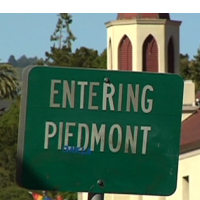Wealthy Town, Surrounded by Oakland, to Photograph License Plates at Municipal Border

The wealthy East Bay city of Piedmont, totally surrounded by the not-so-wealthy city of Oakland, passed an ordinance last week to deploy cameras on every road leading into town to snap pictures of license plates.
The license plate readers will feed the images into a database and check them for matches with plates of known bad characters, thus joining an increasing number of communities that are photographing cars and filing information gleaned from the activities of people who aren’t suspected or accused of a crime.
License plate readers, or LPRs, are used extensively across the country by law enforcement to stock databases with information that pinpoints the movements of its residents. But most of those scanners are within the city, often attached to police cars that click away at anything that moves.
Los Angeles-area law enforcement, at last count, had 180 million license plate images in its database. Vigilant Video, and its National Vehicle Location Service, has more than half a billion license-plate records on file, according to a story published by California Watch. Around 1,200 new law-enforcement users a month reportedly sign up to access the system, which is offered free by Vigilant, even to those agencies that neither buy their scanner nor contribute to the database.
Piedmont is one of the few towns that is setting up cameras to shoot pictures of everyone entering and leaving town. The city council approved spending $678,613 on 39 cameras, to be deployed at 15 locations in the city, with an emphasis on entry points. The system is expected to be up and running by the fall.
The city of 11,000 took inspiration for its plan from nearby Tiburon, which passed a similar ordinance in 2010 after a well-dressed woman was accused of driving around town in a Mercedes collecting other people’s mail, including checks and financial statements, from their mailboxes. She turned out to be from San Rafael.
Civil libertarians and privacy advocates see the growth of LPRs as an overexuberant and relatively ineffective reaction to fears about crime. Their use has become part of a national debate over security/privacy issues that got a shot of adrenalin last week when news broke that the federal government was hoovering up data from the telecoms about everyone’s phone calls and rummaging through personal information stored on the computers of all the major internet companies, like Google and Facebook.
Oakland and Piedmont have always had a strained relationship. Although Piedmont residents have resisted integration with Oakland for more than a century—Oakland absorbed a lot of surrounding municipalities and unincorporated areas after the 1906 earthquake—they share some services, like libraries. And Oakland offers Piedmont residents some of the cultural and shopping resources a small town, even a wealthy one, can’t manage on its own.
While Oakland has made regular overtures to Piedmont that they forge closer ties, the entreaties have fallen on deaf ears. In November, the San Francisco Chronicle reported on efforts by an Oakland high school student to create “an uninterrupted swath of Oakland's famed oak-tree street signs from 105th Avenue clear to the pinnacles of Piedmont.”
Piedmont wanted no part of it. “If I proposed that, I'd be tarred and feathered. I'd be ousted from town,” Mayor John Chiang told the newspaper.
Still, Oakland residents are free to come on by in the fall and indulge in some neighborly hospitality by having their pictures taken without charge—unless their license plate triggers a computer match.
–Ken Broder
To Learn More:
Wealthy California Town Approves License Plate Readers along Municipal Border (by Cyrus Farivar, Ars Technica)
City Council Approves License Plate Reader System Purchase (by Dixie Jordan, Piedmont Patch)
Report: License Plate Cameras Could Exceed $1 Million (by Charles Burress, Piedmont Patch)
Oakland, Piedmont Borders at Issue (by Carolyn Jones, San Francisco Chronicle)
Cameras for the Police (by Richard C. Paddock, New York Times)
Tiburon Police Arrest Woman in Mail-Theft Spree (by Gary Klien, Marin Independent Journal)
L.A. Law Enforcement Sued over License Plate Scanners that Profile Drivers in a Database (by Ken Broder, AllGov California)
- Top Stories
- Controversies
- Where is the Money Going?
- California and the Nation
- Appointments and Resignations
- Unusual News
- Latest News
- California Forbids U.S. Immigration Agents from Pretending to be Police
- California Lawmakers Urged to Strip “Self-Dealing” Tax Board of Its Duties
- Big Oil’s Grip on California
- Santa Cruz Police See Homeland Security Betrayal in Use of Gang Roundup as Cover for Immigration Raid
- Oil Companies Face Deadline to Stop Polluting California Groundwater





